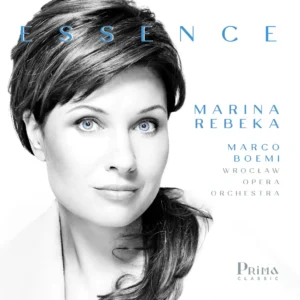
CD Review: Marina Rebeka’s ‘Essence’
By Bob Dieschburg“Essence” is Marina Rebeka’s fifth solo recital on her very own label, “Prima Classic.”
Although it was recorded all the way back in 2021, the album was released only last November; its program therefore does not reflect the soprano’s current engagements nor does it acknowledge her accomplishments in the French repertory.
Instead, it presents like a best-of compilation, with arias from “Madama Butterfly,” “La Bohème,” “Tosca,” “Andrea Chénier,” and other Italian classics with a decidedly veristic flavor. The two outliers are Liza’s aria from Tchaikovsky’s “The Queen of Spades” and Rusalka’s “Song to the Moon.”
All are sung with technical mastery and vocal prowess, turning “Essence” into a demonstration of Rebeka’s operatic skills at their most electrifying.
Verismo and Its Antecedents
The album opens with the longing of Cio-Cio-San; “Un bel dì vedremo” may well be one of the most recorded arias on disc. Yet Rebeka’s take stands out even among the plethora of recordings from all-time greats, both past and present.
The dramatic tension is unwavering, spun on broadly phrased lines with easy tops and an alluring voix mixte. Granted, Marina Rebeka may not be the teenage geisha whom Puccini and his librettists call for. However, it does not diminish the effort which Rebeka so valiantly puts on display, portraying tragedy. This is done without having to resort to pretense, histrionics, or other effects of sentimental artificiality.
The program continues with “L’altra notte in fondo al mare” from “Mefistofele.” There is danger in singing Margherita’s lament in too straightforward a way; after all, “Mefistofele” is a proto-veristic opera on the surface only, but really is ingrained in the vocal style of the Romantic Age.
Rebeka knows this. She delivers the coloraturas rather impressively; they may not be as nuanced as Callas,’ but they are flawlessly integrated into her vocal lines and ringing tops whose stirring vibrato makes her character’s anguish even more poignant.
With “Io son l’umile ancella” and “La mamma morta” she returns to the heartland of the verismo period. Again, her rendition is gripping and the diminuendo on “morrà” from “Adriana Lecouvreur” leaves little to be desired.
At times, her delivery is vaguely reminiscent of Galina Vishnevskaya, especially when it comes to the timbral hues in low tessitura parts. To who currently writes, the overall feel of her “Vissi d’arte,” for instance, resembles the Rostropovich recording of “Tosca” from 1976. Only in exposed passages does Marina Rebeka sound more pastose than Vishnevskaya, in no pejorative fashion that is.
A Plea to the Moon
With “Chi il bel sogno di Doretta” our Latvian soprano ventures into Puccini’s pseudo-operetta “La Rondine.” Though its dreaded arks are well sustained the dolcissimo notation does not transpire to the fullest. As is the case with Lauretta’s “O mio babbino caro,” on track 12, it seems that Rebeka has outgrown the blitheness of the soubrette and that she is much more at home in the full-fledged lyricism of “Rusalka.”
The latter fits her voice like a glove; in her “Song to the Moon” the softness of her inflections combines with sheer lyricism and technical ease, making Rusalka’s plea a hauntingly beautiful highlight of the present release.
“Essence” is a seamless listen, uncomplicated and no less compromising in its utter commitment to tonal beauty and dramatic intensity. Its shortfalls, if there are any, pertain to roles beyond which Marina Rebeka has matured, both vocally and psychologically.
Other than that, her interpretations are stirring, relentless, at times even explosive. In this, “Essence” may differ from Sonya Yoncheva’s “The Courtesan” with which it shares some of its tracks; unlike “Essence,” however, the drama of “The Courtesan” is more suffused, if not diluted with chromatic nuance. Together, however, they form compelling portraits of two sopranos at the height of their careers.


